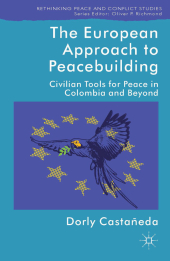 Neuerscheinungen 2014Stand: 2020-02-01 |
Schnellsuche
ISBN/Stichwort/Autor
|
Herderstraße 10
10625 Berlin
Tel.: 030 315 714 16
Fax 030 315 714 14
info@buchspektrum.de |

Dorly Casta¤eda
The European Approach to Peacebuilding
Civilian Tools for Peace in Colombia and Beyond
1st ed. 2014. 2014. xvi, 256 S. 216 mm
Verlag/Jahr: SPRINGER PALGRAVE MACMILLAN; PALGRAVE MACMILLAN UK 2014
ISBN: 1-349-47072-4 (1349470724)
Neue ISBN: 978-1-349-47072-3 (9781349470723)
Preis und Lieferzeit: Bitte klicken
Examining peacebuilding through the intersection of security, development and democracy, Castaneda explores how the European Union has employed civilian tools for supporting peacebuilding in conflict-affected countries by working at the same time with CSOs and government institutions.
Foreword; Jenny Pearce Introduction PART I: THE EUROPEAN UNION AS AN INTERNATIONAL PEACE ACTOR 1. European Development Aid Supporting Peace 2. The EU Decides to Support Peace in Colombia PART II: THE RECEPTION SIDE: ANTAGONIST EXPECTATIONS OF EU ACTIONS FOR PEACE 3. EU´s Support for CSOs: Breaking Authoritarianisms 4. EU as the Perfect Ally for the War Against Terrorism PART III: EUROPEAN PEACEBUILDING AS A PROCESS 5. The European Union Learning Process on Peacebuilding in Colombia 6. Peacebuilding on the Ground: the European Approach Conclusions: the European Approach to Peacebuilding
"Cooperation with middle income countries may not be significant for the funding involved, but can make a large difference when working in conflict-affected areas where the linkages between citizen and the state and among citizens have been destroyed by years of violence - if they ever existed. Dorly Casta¤eda provides a deep insight in the complexity of the relations between governments, donors and civil society organizations for the definition of development programs which objective is building peace."
- Jose Antonio Ocampo, Columbia University and Former UN Under-Secretary-General for Economic and Social Affairs and Minister of Finance of Colombia
"Casta¤eda´s book brings an outstanding food for thought to understand the EU as a softpower. Based on field work, it is an excellent analysis on how the EU contributes to peace in Colombia by working simultaneously with civil society organizations and the government in conflict. Casta¤eda´s research is a compulsory reading for all scholars and students who have questions on the civilian approach of peacebuilding. It will also captivate Latin America´s specialists who wants to understand the long and chaotic process that led the Colombian government and the FARC guerillas to peace." - Chirstian Lequesne, CERI Sciences Po, Paris, France
"In an increasingly interdependent world, Dorly Casta¤eda provides us with a very important and timely study on the contribution that an institution such as the European Union has made promoting democracy, development and security, by encouraging peace building in countries affected by armed conflict. The European Union itself as a project was the result of a transition from war to peace and Dorly Casta¤eda´s study emphasizes the uniqueness of Europe´s impact and methodology. This book is an essential contribution to today´s international security debate, that often emphasizes military and counter-terrorism measures. I hope it will inspire practitioners and policymakers to think more creatively in how to build peace and security in countries affected by violence." - Aldo Civico, Rutgers University, USA
"Is the European Union an actor in international relations? Dorly Casta¤eda brilliantly answers this question by demonstrating that the peacebuilding approach of the EU constitutes a unique and the most performing aspect of its international action. Dorly Castaneda´s case study mostly revolves around the action of the EU in Colombia, which makes of this profound, stimulating and exciting reflection on European civilian action for peace a major contribution to Peace Studies. It is a piece of work students, academic and practitioners cannot do without." - Guillaume Devin, Institut d´Etudes Politiques de Paris - Sciences Po, France


